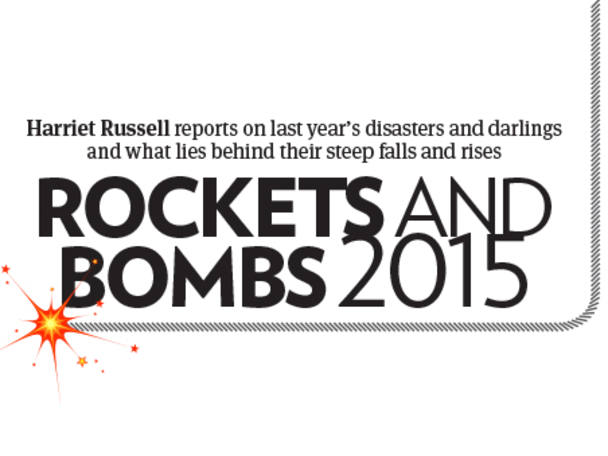Some stocks go up, some go down. Sometimes the reasons are clear, sometimes they're not. That's the gamble any investor makes by investing in equities and this year was no different. It was a big year for mergers and acquisitions, the continued rise of global terrorism, bribery scandals and debt crises - all of which played their part in affecting the trajectory of London share prices. In this piece, we look at six winners and losers across the three main indices, the FTSE 100, FTSE 350 and Aim on a percentage point performance basis.
FTSE 100 rocket: Hargreaves Lansdown
As more people take their investments into their own hands, platform provider Hargreaves Lansdown (HL.) has managed to consistently grow its market share to claim its place as the dominant leader at this end of the financial services sector.
The shares had been under pressure for much of the past 12 months as investors nervously waited for the full impact of the retail distribution review (RDR) and the potential changes Hargreaves would be forced to make in how it collects fees. But those changes were not as drastic as expected and the shares have enjoyed a serious re-rating since its results in September, when we upgraded our view from hold to buy.
Hargreaves' shares trade at a big premium to the market, but that's justified by its growing share of platform assets - now at 35 per cent, compared with 33.6 per cent last year. Total assets under administration also rose last year, up 18 per cent to £55.2bn - and that's before accounting for £370m of assets acquired from JPMorgan Asset Management.
Looking further out, there are fewer obstacles standing in Hargreaves' way. A high interest rate environment would allow for better recovery in the group's interest income stream, but the passing through of RDR (the retail distribution review) means investors aren't as fearful as before. A forward PE ratio of 43 isn't cheap, but it reflects the group's incumbent position in the market. (Last IC view: Buy, 1,172p, 9 Sep 2015)
FTSE 100 bomb: Glencore
We also had our finger on the pulse with Glencore (GLEN) this year. In fact, we identified serious problems at the group - specifically its enormous debt pile - as far back as 2011 when it first joined the London Stock Exchange. But a research note from broker Investec in late September 2015 officially sent the share price into a tailspin, leaving the stock down more than 70 per cent year on year.
A recently announced debt-reduction package - including a controversial $2.5bn (£1.6bn) cash call - has been little help in silencing critics. That's because the group has effectively ignored a commitment to give existing shareholders the right of refusal to participate in future equity fundraisings. And, after all, any attempt to bring the debt under control will be pretty futile if commodity prices don't start to recover. Citigroup - Glencore's house broker - has tried to see it from its client's side, but has also floated the idea of taking the group private again, implying there would be better scope for a restructuring.
It's worth remembering that miners - and their oil and gas cousins - have all had a terrible year as prices across natural resources plummeted. Anglo American (AAL) was the second-biggest faller inside the FTSE 100 this year, with the shares down 69 per cent on a year-on-year basis. (Last IC view: Hold, 88p, 30 Sep 2015)
FTSE 350 rocket: Betfair
Betfair (BET) might have been the biggest riser in the FTSE 350 this year, but much of that is down to a well-timed £6.5bn merger approach from market favourite Paddy Power (PAP). Once the deal completes the merged entity would be one of the world's largest public online betting and gambling companies by revenue at more than £1.1bn, and Peel Hunt analyst Nick Batram has dubbed the new company a "must own" for investors.
The sector has been ripe for consolidation following the introduction of a new 15 per cent gaming duty for online gamblers selling to customers in the UK, regardless of their official tax domicile. Other mergers this year include proposed combinations of Ladbrokes (LAD) and Gala Coral, and Bwin.Party Digital Entertainment (BPTY) and Aim-traded GVC (GVC).
The proposed deal means Paddy Power's shareholders will own 52 per cent while Betfair's will own 48 per cent of the combined group. The Irish company's shareholders will also receive a special dividend worth a combined €80m (£58.7m) as "part of the value equation agreed by the two parties". It's also interesting to dig into the history of company board members at this point: in 2012, Betfair poached now chief executive Breon Corcoran from Paddy Power. Mr Corcoran is expected to become the chief executive of the combined group, while Andy McCue - the boss at Paddy Power - will move to chief operating officer. (Last IC view: Await documents, 3,532p, 25 Nov 2015)
FTSE 350 bomb: Afren
Unsurprisingly, now-suspended Afren (AFR) was the worst of the FTSE 350 performers this year. The oil and gas explorer and producer requested its shares be struck from the stock exchange in July ahead of a shareholder vote on a major restructuring. That restructuring involved tapping investors for another $30m (£19m) after the group revealed near-term production would fall significantly below expectations, leaving its financial position in doubt. But this wasn't the first time Afren had courted its shareholders for a bailout. The group had urged the largely retail shareholder base to back a heavily dilutive debt-for-equity swap and an open rights offer that could have raised $75m earlier in the year.
Investors Chronicle urged any investors to sell out of Afren on news of the restructuring, following a 279 per cent gain in the five-and-a-half years we were buyers of the stock. We exited that buy advice in March 2014 as the shares were trading at an all-time high, and ahead of the shares' drastic collapse. The latest announcement from the group in August 2015 revealed that it had appointed AlixPartners as administrator. It said any joint ventures and company partners could possibly escape unscathed, but there's been no official word as yet. (Last IC view: No longer listed)
Aim rocket: Formation Group
The best performer on Aim is a company not yet covered by Investors Chronicle. Formation Group (FRM) provides construction services to the property sector and has a micro market capitalisation of just under £23m. The shares have risen a staggering 509 per cent this year. That improvement was so notable that the group was forced to issue its own acknowledgment of the share price movement. In July it said the share price was reacting to the possibility that the group would sign a large commercial contract on a development site, which later turned out to be a profit share agreement with Sunbel Development and Pinacle Developments in relation to a development property at Cromer Court, 9-19 Streatham High Road, London, which is being converted from office space into 98 residential units.
Although the numbers it deals with aren't huge by public company standards, Formation's share price has also benefited from the group's financial outperformance this year. In late September, the group admitted trading had been so strong it expected to report yearly pre-tax profit well in excess of the original £1.75m expected, as well as record revenues. The group has a full order book and the cash generated from a slew of profit share agreements has significantly bolstered its balance sheet. (No IC view)
Aim bomb: PeerTV
As is to be expected in the more volatile Aim market, when a stock loses, it tends to lose big. This year's victim was PeerTV (PTV), whose share price has flatlined so badly the company has been left with a market capitalisation of just £509,000.
The problem appears to lie with the group's subsidiary, Digitek SMT Assemblies, in which it holds a 64.1 per cent stake. Digitek failed to find approval from holders of its secured loan notes, which it needed to formally restructure. Digitek assembles electronics products and components for companies in the telecommunications industries. PeerTV had offered to exchange 100 per cent of the loan notes in issue for a 70 per cent stake in Digitek, but shelved this offer after negotiations appeared to fall through. It followed up by saying it would no longer involve itself in supporting the financing of the company, although it remained committed to the remainder of its television-over-the-internet business. Even so, it might be too little too late: the shares have lost nearly 100 per cent of their value in the past year. (No IC view)








